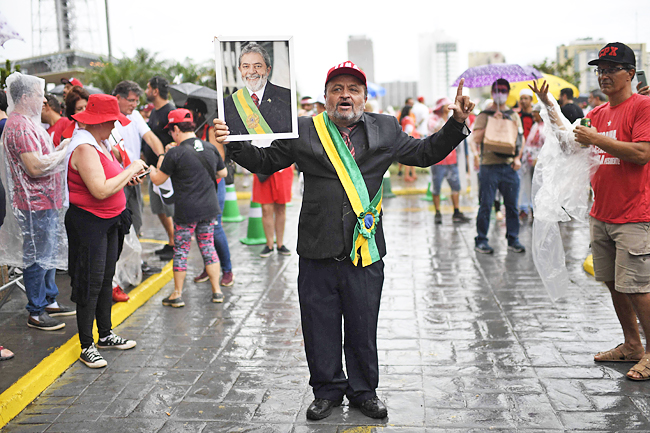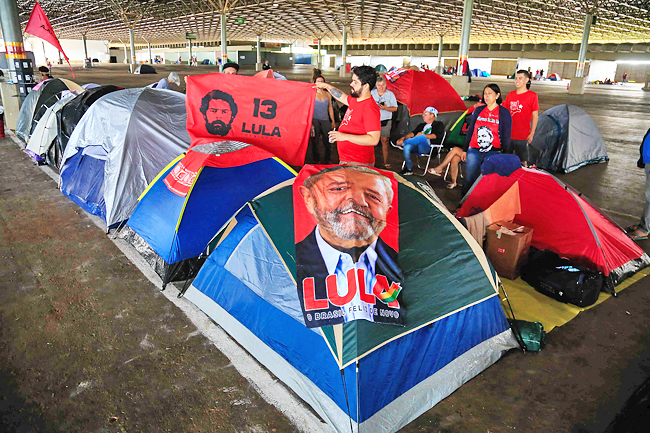RIO DE JANEIRO (AFP) – Brazil’s Luiz Inacio Lula da Silva, who assumes the presidency yesterday, faces a long list of hurdles from healing a deeply divided country to battling poverty and hunger in the face of severe budget constraints.
A “Herculean task” awaits the new head of Latin America’s largest economy, a country of 215 million of whom more than half face food insecurity, Lula’s vice-president to be Geraldo Alckmin has conceded. Lula’s transition team blames four years of “irresponsible management” under far-right leader Jair Bolsonaro for plunging the country into a dismal state of scarcity and declines in social welfare, education, health and environmental protection.
To help him tackle these challenges, Lula spent weeks in tough negotiations to put together a team of ministers, now ready.
This first hurdle, even before taking office, meant Lula had to find a way to accommodate leftist allies who made his election possible but also the centre of the political spectrum whose support he will need in Congress.
The Senate and Chamber of Deputies that emerged from October’s general elections now lean even more towards the right than before.
But analysts say Lula’s hands are not completely tied, having managed to assemble a loose parliamentary alliance ranging from the far left to the centre right.
Lula, who has vowed to “make Brazil happy again”, takes the reins of a country in which 58 million people did not vote for him and whom he will have to appease.


The stain of a corruption conviction, since overturned, popularised Lula for many Brazilians and the October elections went down to the wire. While many have fond memories of economic prosperity under Lula’s first two presidencies from 2003 to 2010, many others voted for him merely to see Bolsonaro’s back.
The victory was a narrow one and Lula garnered 50.9 per cent of the vote to Bolsonaro’s 49.1 per cent.
Two months after the vote, Bolsonaro’s backers are still protesting outside military barracks demanding the army to step in to prevent Lula’s swearing-in.
If he listens to his transition team, Lula’s first priorities will be putting a stop to the environmental destruction that worsened under pro-business Bolsonaro, improve the underfunded education system and address racial inequality.
He should also seek to restrict firearms possession, which exploded under his conservative, pro-gun predecessor.
On the international scene, Lula will face the task of reconciling Brazil with allies alienated by the ultraconservative and controversial Bolsonaro.
Lula’s transition team has noted that Brazil “lost its prestige” in the preceding four years and Brasilia owes nearly a billion dollars in unpaid contributions to multilateral bodies including the United Nations (UN).
The new president has an advantage in this area. He is widely liked abroad and was once described by former United States (US) president Barack Obama as “the most popular politician on Earth”.
In particular, the international community expects Lula to take strong action on the climate and the environment, first and foremost boosting Amazon protection.
Lula vowed in November at the COP27 climate summit saying, “We will do whatever it takes to achieve zero deforestation” and an end to ecosystem degradation by 2030.
But to achieve this, he will have to reinvigorate oversight bodies, decimated under Bolsonaro, to stop illegal logging and mining without alienating Brazil’s powerful agribusiness lobby, a key ally of his rival.
Brazil’s economic and social situation will also pose a major challenge for Lula, who has said his “priority is to take care of the poorest”.
The recent approval by Congress of a constitutional amendment that would allow him to finance his campaign promises, at least for a year, was a welcomed first step.
Despite caps on public spending, it allows him to increase the so-called “Bolsa familia” welfare payment to Brazil’s poorest families as well as the minimum wage.
Some 125 million Brazilians are food insecure and 30 million, the same number Lula is credited with lifting out of poverty during his first two terms, are hungry.







